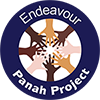This is Saima’s story…
My name is Saima and I am 29 years old. I was born and raised in Pakistan in a small village on the border of Karachi. My family are working people and they did the best they could for me and my four siblings. I studied until I was 16 and then began helping my parents.
I was 25 when my father started looking for my suitor for marriage. I was introduced to Abdul, a distant relative’s son and they lived in Birmingham, UK. He came to Pakistan on his own and over a period of a few days we both agreed to go ahead with the marriage.
He was funny and attentive, appeared to be interested in me and when he agreed for marriage I was very happy. After 2 weeks of seeing each other we had our Nikaah – Islamic wedding ceremony. I was happy I had found the person who I was waiting for.
Following the marriage, Abdul had to return to the UK, we completed my visa application in hope that I would soon be able to join him. My application was rejected the first time and this upset me. I spoke with Abdul but not often and when we did it was a short conversation. I presumed he was tired with work. When my visa was granted, I was very eager to come to the UK and join both Abdul and my new family.
When I arrived, Abdul came alone to the airport and it was amazing seeing him after so long. At his family home, his mother and sister in laws were very distant and did not speak to me. My mother in law told Abdul that I had to keep my belongings downstairs as there was no space for them. My first night I had to stay with my mother-in-law, she wanted me to rub her legs whilst she fell asleep. I thought that she wanted to spend time with me but this was not the case; there was no communication between us at all and she told me to sleep on the floor with a blanket saying, ‘you are used to sleeping on the floor so it shouldn’t be a problem’.
Abdul did not speak to me and did not appear bothered about the arrangement. He stayed away from me and I was told to stay in the kitchen with the rest of the women. Eventually, I pressed Abdul that being his wife I have to sleep in his room. He begrudgingly made space for me.
My mother-in-law said I had to call my family in Pakistan in her presence. I cried deep down when informing my family about my wonderful new home.
I am shy, it takes a while for me to open up and be comfortable in another person’s company. His family saw this as being arrogant and regularly told Abdul about his poor choice of marriage and how they disapproved.
My sister-in-laws did not accept me. They made me do the chores they didn’t want to do and often would blame me when something went wrong. I was taunted and laughed at because of my appearance and limited English. I was shunned and they did not want me to eat with them. I had to wait until the family had eaten and the remaining food I would have to eat alone. When I fell ill they refused to buy me medicine or take me to the doctor.
I was broken. I had no support and no means of getting out. I wasn’t allowed to speak to my family alone and although Abdul brought me a phone so he could check on me, he failed to add credit.
Abdul would get angry at me and he would often not come home. After six months, Abdul physically assaulted me for the first time. I had ironed his shirt wrong. This led to him grabbing me by the shoulders and shoving me against the wall. He was spitting at me and shouting in my face. He threw me on the floor. Family members but failed to come and check on me.
The aggression, anger and temper on Abdul began to grow and the physical abuse became regular. I had nowhere to turn and was very scared of how far he could go. I would hear my mother-in-law speaking to Abdul after he returned home and she would tell him what I had failed to do. She began provoking him and I knew that this would lead to a further beating.
One day I was out with my mother-in-law where we went to an auntie’s house. I passed a doctor’s surgery and although I was very conscious of never looking up something in the window caught my eye. It was a poster in my language; I understood and read it quickly. The number to ring if in danger was 999. That was me; every day.
I began wondering what could happen if I told anyone about my life – I could not speak English well – would I be supported.
One day, I was beaten by my mother-in-law. She burnt my arm but said it was by accident. Later that evening Abdul came into our room. He began throwing my clothes on the floor and was angry. I tried to leave but he pulled me by the hair so hard it caused me to fall. He sat on top of me grabbing my throat. I couldn’t breathe; I was trying my hardest to break free and scratched his face. He released me but then began screaming that I had hit him. He left the room to tell his family and I knew that his mother would hurt me more.
I saw my phone, this was my only chance. I rang 999 and the only thing I could say was ‘Please, help me’.
I don’t know how long it was but there was a knock on the door. The police officers were speaking English and one was female. They searched the home then came upstairs. They were stopped by Abdul but moved him aside; I was cowered in the corner fearful of who was going to walk in.
The female officer immediately saw me. I didn’t understand but she comforted and reassured me. I was very scared. The other officer remained with Abdul and the family downstairs whilst the female officer spoke to me. She saw my injuries and fear and took me outside to her car.
It was this day that changed my life…
I didn’t make a statement against Abdul or his family. I feared if I did then they could cause harm to my parents in Pakistan.
The police moved me to temporary accommodation in Bolton and I was supported by staff. I had no friends and as I was on a spousal visa I had no access to money. My case was referred to Endeavour and I was allocated a caseworker who could speak my language. This instantly made me feel reassured and I told her everything.
My case worker came to see me and spoke to me daily. She supported me in applying for the DDV Concession with the Home Office and once my permit had come through this enabled me to apply for public funds. I applied for Universal Credit; this took time for it to come through but my worker gave me food, toiletries and clothes as I had left with nothing. This helped me a lot.
I had never had a bank account nor was allowed this. My worker attended the bank with me and together we opened an account. She told me this would be just for me; I was shocked at having control of money for the first time.
I lacked confidence in the way I looked and presented; I was scared to speak in case I said something wrong but my caseworker provided me with emotional support. She listened and made me believe that I can move forward.
Although I did not report my husband and his family I no longer wanted anything to do with them. I wanted to apply for a divorce and no longer be attached to him. My worker spoke to me about seeking advice around divorce and I agreed for her to help me in this; my appointment was arranged and I sought advice to take this further. It made me feel in control and strong.
Living in Bolton gave me the courage to walk out, no one knew me so I had no fear. I began to see that people were accessing groups in the community and I also tried this. I started college to improve my English and began making friends
After four months of my temporary status being granted, the news arrived that I had been granted indefinite leave to remain. Shortly after, my worker encouraged me to move on from temporary accommodation.
I was 29 and to have my own home was not something I had ever imagined. Especially in a country I was not familiar with but this was a chance to make my own future on my terms and with me being in control.
This feeling overwhelmed me but I felt very happy. I began smiling and telling my family.
I am now in my own home- with my own finances. I have friends and people to support me.
I can now look up and walk, but most importantly I am happy.







